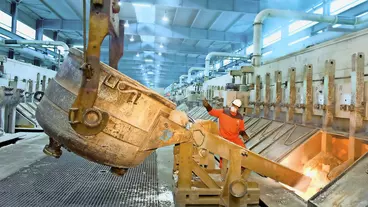Rheinmetall Automotive CEO Horst Binnig: “E-mobility not without I.C. know-how”

“The worldwide boom in electromobility will also have a lasting and positive impact on traditional specialists in combustion technology,” says Horst Binnig, CEO of Rheinmetall Automotive, in the run-up to the Auto Shanghai trade fair, which opens its doors on 18 April.
“For all new driveline systems, automobile manufacturers need the support of a functioning supplier base and, above all, the longstanding accumulated supplier expertise in the areas of development and production technology. The prerequisite, however, is that these companies have recognized the change in good time and set up their business strategy accordingly at an early stage,” says the CEO of this longstanding German development partner of the international automotive industry.

This applies in particular to those components of electric drivelines that require complex and expertise-rich production processes. Binnig cites as just one example the aluminium casting of housings for electric motors, which his company currently produces for Volkswagen China in Guangde, some 200 kilometres west of Shanghai. The complex cooling system of this component, which contributes to the necessary temperature control of the electric driveline, requires a special casting process developed exclusively in Germany to series maturity and meanwhile successfully used in China.
For the Rheinmetall Automotive CEO, the battery pack carriers, which require temperature control as well, are also part of this extremely know-how-rich product range. This is an area in which also start-ups are dependent on the input of traditional suppliers from the automotive sector.
Binnig even goes one step further: “Electric coolant pumps, which have already been used in combustion engines for many years, but also innovative heat pumps, are necessary to ensure the complicated temperature management of power electronics, electric motor or battery in addition to heating the passenger compartment.” Last but not least, electric vacuum pumps might also be added, he continues, in order to build up the necessary brake pressure in electric, hybrid or even fuel-cell vehicles.
Simply in terms of e-mobility, the head of the globally operating specialist for engine emission reduction and efficiency improvement cites an order intake of more than RMB6 billion (over €800m) for his company.
In China, Rheinmetall Automotive employs around 5,000 people at 16 locations and in 2018 generated total sales of around RMB8 billion with its local joint ventures and wholly owned subsidiaries (€1bn). This corresponds to currency-adjusted a growth of 5.7 percent compared with 2017.

An analysis of the worldwide aluminium market at the turn of 2023/24 and an outlook for the year 2024.

Since the last aluminium trade fair, the Irish handling specialist Combilift has developed new products that will be presented in Düsseldorf in October 2024.

Aluminium China, Asia’s premier trade show and B2B platform for the aluminium industry and its main application fields, is set to return to Shanghai from 3-5 July.
